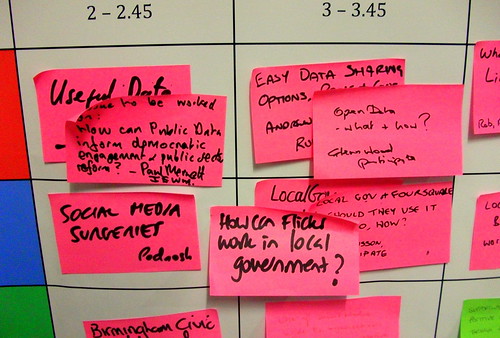No great surprises in here, but a rough transcript of what Eric Pickles is saying:
- We don’t need to waste time defining localism, it will strangle it.
- Don’t salami slice, the old patterns of spencing wont return
- Put everything under the spotlight and ask we do we really need the money to do.
- Do we really need separate, planning, comms or chief executives?
- Waste has shown a lack f respect towards the public and public money.
- Greater transparency will revolutionise the way government works.
- It will say to suppliers that the government is no longer there to be fleeced.
- The public can judge public spending for themselves and perhaps public servants will take greater care when they know there will be an army of armchair auditors checking their working.
- Much more radical:
- Re-examine how every council works. There’s no point in wasting time on restructuring layers of authorities.
- Birmingham is saving £430,000 a year sorting its own post
- Worcestershire has counted 24 agencies working with young people and is looking to cut this down.
- Tests – does it need to be done, does it provide value for money, are we the best people to be doing it.
- It’s not my job to sit behind a desk like a puppet master pulling strings, instead I want to cut away those strings,
- Hammersmith and Fulham came up with 100 bureaucratic burdens they are working against.
- If councils working with residents want to set themselves goals that’s up to them, but National Targets mean councils are working ion this that matter to Whitehall. I’d rather councils tackle local issues.
- A conservative estimate of the total for one local authority area is £7 million across 1500 indicators (including health policing etc)
- Today I am scrapping Local Area Agreements. It’s up to local councils to keep or dump the indicators as they see fit.
- We will just have one list of every bit of data the government needs from you.
- We will give council’s freedom, power and responsibility. Stronger say on planning and a central role in the health service.
- The localism bill will go further, through a general power of competence they will be able to do whatever they want to do. I want to make sure councils can take charge of their own money, borrow against future income, pool budgets across the public sector to tackle social problems. We have freed up £1 billion of ring fenced money.
- I don’t want council’s checking with me on everything, some councils feel they cant do anything without my permission. We need a new culture of action and decisiveness.
- There is going to be a lot less money. I will make sure that you have what you need to tackle problems with new powers. Local Governments natural instinct is to use innovation to adapt very quickly, most of the smart way to deal with deprivation or housing comes through local government.
See also www.communities.gov.uk/newsstories/localgovernment/1740490
